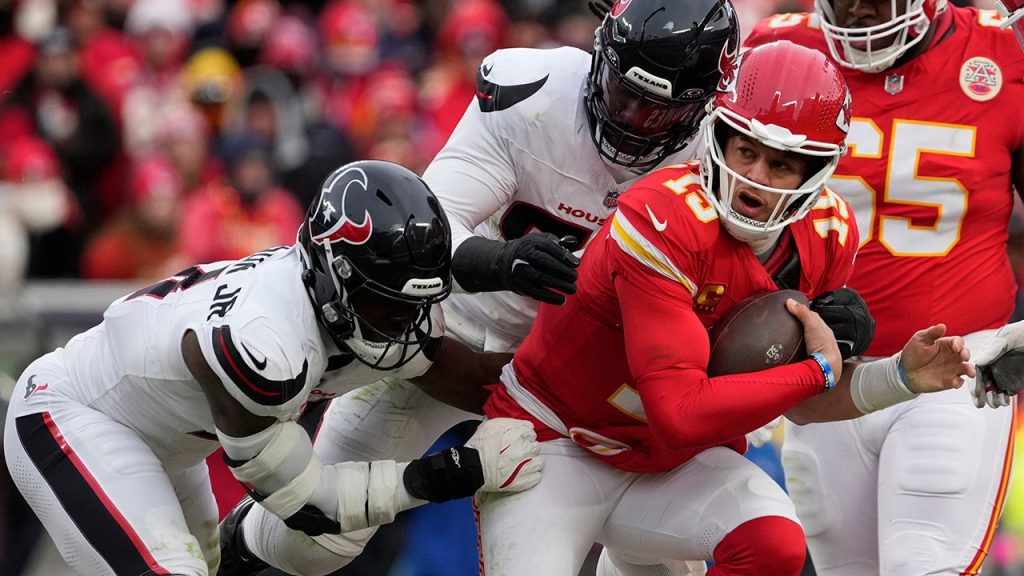The Kansas City Chiefs’ 23-14 victory over the Houston Texans in the AFC divisional round playoff game was marred by controversy surrounding several questionable officiating decisions that sparked widespread criticism and fueled accusations of bias. Two penalties called against the Texans drew particular ire, both occurring at crucial moments and potentially influencing the game’s outcome. The first involved Texans edge rusher Will Anderson Jr., who was flagged for roughing the passer after appearing to push Chiefs quarterback Patrick Mahomes in the chest following an incomplete pass. The second penalty occurred during a Mahomes scramble in the third quarter, when Texans linebacker Henry To’oTo’o made contact with Mahomes around the neck area as the quarterback slid to the ground. Many observers, including prominent broadcaster Troy Aikman, deemed both calls excessively harsh, arguing that they unfairly benefited the Chiefs.
The penalty against Anderson extended a Chiefs drive that ultimately resulted in a field goal, while the penalty against To’oTo’o pushed Kansas City further downfield, culminating in a touchdown. These pivotal moments fueled the perception among Texans players and fans that the officiating crew was biased against them. Aikman vehemently criticized the penalty on To’oTo’o, asserting that Mahomes was treated differently as a quarterback compared to other ball carriers. He argued that Mahomes “played games” with defenders to draw penalties, a practice he believed should be addressed by the league. The former Dallas Cowboys quarterback wasn’t alone in his assessment; social media platforms buzzed with complaints about the officiating, with many users expressing similar sentiments.
The frustration among the Texans wasn’t confined to the broadcast booth. Following the game, Texans head coach DeMeco Ryans alluded to the officiating, suggesting that his team was fighting an uphill battle against everyone, including the officials. Ryans’ comments echoed a sentiment shared by many Texans fans, who felt that the officiating crew had significantly hampered their team’s chances of winning. Anderson added fuel to the fire by claiming that the team knew it would be facing adversity not only from the Chiefs but also from the referees. Running back Joe Mixon also weighed in, expressing his frustration with the officiating and implying that the perceived bias was evident to everyone.
The controversial calls prompted head referee Clay Martin to address the media after the game. Martin explained that the penalty against Anderson was called due to “forcible contact to the face mask area,” while the unnecessary roughness penalty on To’oTo’o stemmed from forcible contact to Mahomes’ “hairline.” While Martin’s explanations aimed to clarify the reasoning behind the penalties, they did little to quell the rising tide of criticism and skepticism. The explanations, especially the one regarding contact with Mahomes’ hairline, seemed particularly inadequate to many observers, who felt they didn’t fully justify the severity of the calls. The controversy surrounding the officiating highlighted the ongoing debate about the consistency and fairness of NFL officiating, particularly in crucial playoff games.
The penalties overshadowed a strong defensive performance by the Chiefs, who consistently pressured Texans quarterback C.J. Stroud throughout the game. Stroud was sacked eight times, including three by defensive end George Karlaftis, disrupting the Texans’ offense and contributing significantly to the Chiefs’ victory. Despite the Texans’ offensive struggles, the narrative surrounding the game quickly shifted from the Chiefs’ defensive prowess to the controversial officiating decisions. The focus on the officiating overshadowed what could have been a discussion about the Chiefs’ defensive dominance and strategic adjustments against a young and inexperienced quarterback.
The incident underscores the ongoing challenge faced by the NFL in ensuring consistent and unbiased officiating. The league has implemented various rules and procedures to improve officiating, including the use of instant replay and the centralized review of certain calls. However, the controversy surrounding the Chiefs-Texans game highlights the limitations of these measures and the inherent subjectivity involved in officiating fast-paced, high-contact sports. The debate about the officiating in this game is likely to persist, serving as a reminder of the crucial role referees play in shaping the outcome of NFL games and the ongoing need for improvements in officiating consistency and accountability. The calls will be dissected and debated, potentially influencing future rule changes and officiating protocols. The incident stands as a stark reminder of the impact officiating can have on the perception of fairness and the integrity of competition in professional sports.

